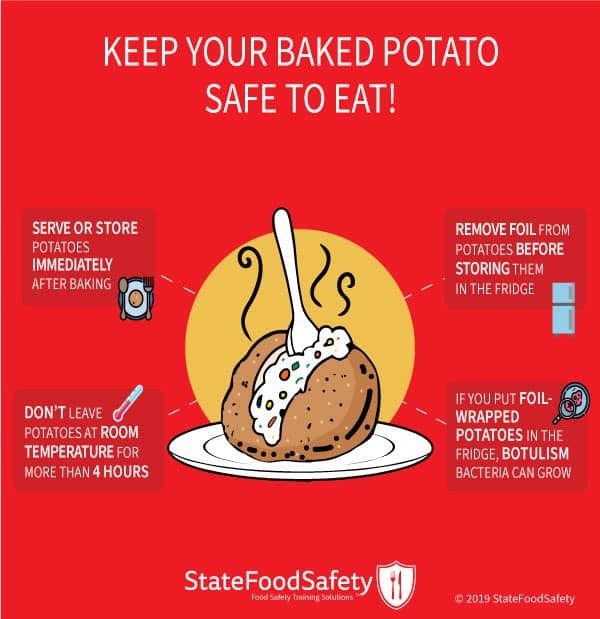Baked potatoes are a simple, satisfying meal. But did you know they can pose a food safety risk if not handled properly? Let’s explore whether a baked potato is a TCS food (Time/Temperature Control for Safety food) and how to keep yourself safe.
 An infographic explaining how to ensure your baked potato is safe to eat.
An infographic explaining how to ensure your baked potato is safe to eat.
What is a TCS Food?
TCS foods require specific temperature and time controls to prevent the growth of harmful bacteria. These foods are more likely to cause foodborne illnesses if not handled correctly.
Baked Potatoes and the Risk of Botulism
One of the primary concerns with baked potatoes is the potential for Clostridium botulinum growth, which can cause botulism. Botulism is a severe illness that can lead to paralysis and even death. Symptoms include difficulty breathing and swallowing, blurred vision, and dry mouth.
Clostridium botulinum thrives in low-oxygen environments. This is where baked potatoes wrapped in aluminum foil become a concern. The foil creates a low-oxygen environment, which, combined with improper cooling, can allow the bacteria to flourish.
Why Foil Matters: Soft Skin, Potential Danger
Aluminum foil is often used when baking potatoes to keep the skin soft. While this is perfectly safe if handled correctly, it’s crucial to understand the risks associated with leaving foil-wrapped potatoes at room temperature.
The Temperature Danger Zone
The “temperature danger zone” is between 41°F and 135°F (5°C and 57°C). Within this range, bacteria multiply rapidly. Baked potatoes left in this temperature range for extended periods are at high risk of developing unsafe levels of bacteria.
Is a Baked Potato a TCS Food? The Answer
Yes, a baked potato is considered a TCS food. This is because the cooking process increases the moisture content of the potato, making it more susceptible to bacterial growth. Uncooked potatoes, with their lower moisture content, are not typically considered TCS foods. The combination of cooking and potential improper handling makes baked potatoes a TCS food.
Identifying TCS Foods: Five Key Questions
To determine if a food is a TCS food, consider these five questions:
- Acidity Level: Does the food have a high or low acidity level? Bacteria thrive in low-acid environments.
- Moisture Content: How much moisture does the food contain? Higher moisture content promotes bacterial growth.
- Acidity and Moisture Interaction: How do the acidity and moisture levels interact? High moisture and low acidity create a favorable environment for bacteria.
- Heating and Cooling Sensitivity: Does the method of heating and cooling the food matter? TCS foods require careful temperature control during cooking and cooling.
- Specific Storage Requirements: Does the food need to be packaged or stored in a specific way? Special storage requirements often indicate a TCS food.
Safe Handling of Baked Potatoes: A Guide
To ensure your baked potatoes are safe to eat, follow these guidelines:
- Don’t: Leave baked potatoes at room temperature for more than four hours, regardless of whether they’re wrapped in foil. Other bacteria can grow even if botulism isn’t a risk.
- Do: Serve potatoes immediately after baking or store them in the refrigerator to maintain a safe temperature.
- Don’t: Refrigerate baked potatoes wrapped in aluminum foil. The slow cooling process within the foil can create conditions for botulism.
- Do: Remove aluminum foil from potatoes before refrigerating them. This allows the potato to cool quickly and prevents the development of low-oxygen environments.
Enjoy Your Baked Potato Safely
By understanding the risks and following these simple guidelines, you can safely enjoy baked potatoes without worrying about foodborne illnesses. Remember that baked potatoes are a TCS food, so proper handling is essential.
References
- Centers for Disease Control and Prevention (CDC): https://www.cdc.gov/botulism/
- StateFoodSafety: https://www.statefoodsafety.com/